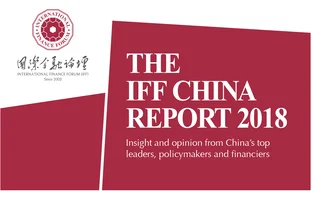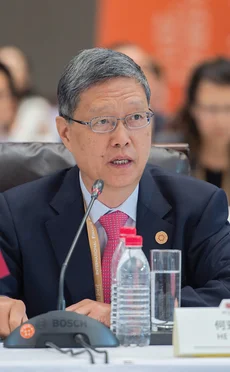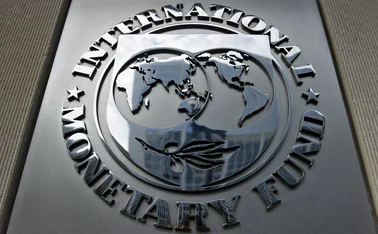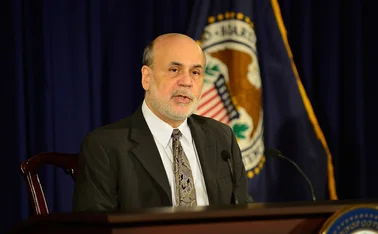
The BRI – A new model of international co‑operation
Globalisation is at a crossroads. He Yafei, former China vice-minister of foreign affairs and former China co-ordinator of the Group of 20, explains that China’s unique approach to global challenges will light the path to a more open, inclusive and equitable world economy


Since the 18th National Congress of the Communist Party of China (CPC) in 2012, which ushered in a new historical era of relations between China and the rest of the world, President Xi Jinping has proposed a series of global public initiatives that embody Chinese thinking and are inspired by the success of China’s domestic governance. These programmes target the future of globalisation and global governance by addressing the increasingly serious problems of deglobalisation, fragmentation and rising populism. The most critical of these is the Belt and Road Initiative (BRI). The principles of extensive consultation, joint contribution and shared benefits proposed in 2013, and the spirit of the Silk Road – “peace and co-operation, openness and inclusiveness, mutual learning and mutual benefit” – were put forward at the Belt and Road Forum for International Co-operation in May 2017. President Xi’s series of guiding principles on innovating global governance not only supplies China with important guidelines, core concepts and concrete methods for more prominent participation in global governance, but also provides a public springboard for innovative ideas and models of global governance.
President Xi’s way of thinking is manifested in the reaffirmation of the Group of 20 as the central platform in global economic governance and consensus on global governance reform reached at the G20 Hangzhou summit in 2016. This direction of thinking is also evident in his proposal for democratic international relations based on peace, co-operation and mutual benefit to build a global partnership network. President Xi’s thoughts are also epitomised in the phrases that he popularised at the World Economic Forum Annual Meeting in 2017: “the community of shared interests” and “the community of shared future for mankind”. These concepts and doctrines are intrinsically and culturally Chinese, and are closely integrated with the policy of reform and ‘opening‑up’, as well as the acceptance that globalisation is bound to undergo great change. The international community is paying close attention to China’s full assumption of its responsibilities.

The creation of a shared community – a community with a shared vision for the future of mankind – is the philosophical foundation of the BRI, and the BRI is an important path to achieving the goal of the community of shared future. Intimately connected, the two can be likened to a path and a road.
President Xi has declared that “people’s aspiration for a better life is what we are striving for”. This is not only the goal of China’s development, but of global governance innovation. The BRI can manifest the spirit of inclusiveness, fairness and sharing, and it is hoped it can enable people in countries along the Silk Road Economic Belt to attain a greater sense of participation, economic success and happiness. People are the masters of history; they are also the owners and driving forces of globalisation. Whether it is the BRI, the collaboration of the Brics nations – Brazil, Russia, India, China and South Africa – or the Shanghai Cooperation Organisation, whether it is about establishing a global partnership or promoting the community of shared future for mankind, these new ideas and methods proposed by China always prioritise the fundamental interests of all peoples.
We currently stand at a crossroads between globalisation and deglobalisation. As Western neoliberalism declines, global governance cries out for structural reforms and a new guiding ideology and development model. The BRI has innovated the model of international co-operation, intending that countries along the Silk Road Economic Belt treat each other as equals, seeking common development, making progress together and enjoying common prosperity. Undoubtedly, the BRI combines the Chinese Dream with the world’s dream, and reflects the high degree of consistency and parallels between China’s national interests and the interests of the international community.
“The Belt and Road is not a Chinese solo [performance], but a chorus of people of all countries; it is not China’s own back garden, but a beautiful garden shared by all countries.” The implication of President Xi’s assertion is that the BRI will encourage universal participation of people living in the countries along the Silk Road Economic Belt. Globalisation must be steered onto the right path, and success must not be the prerogative of a few countries, multinational corporations or interest groups. To usher in a new era of globalisation, the interests and happiness of people must always be prioritised.
The opening‑up and co-operation embodied by the BRI will bring about the full integration of different civilisations in Eurasia
The BRI will surely help drive globalisation forward in a more open, inclusive, equal and united way, enhancing and expanding openness and co-operation. President Xi said that only a prosperous nation could pursue opening‑up with confidence and accelerate its own development. In the new era of globalisation, China will remain committed to a new pattern of all-round opening‑up to the outside world – to developed and developing countries – reforming global governance by closing loopholes and exchanging Western dominance for collaboration between the Eastern and Western worlds.
The opening‑up and co-operation embodied by the BRI will bring about the full integration of different civilisations in Eurasia, laying a solid foundation for the community of shared future for mankind and lending a new and robust impetus for world peace and economic growth. By supporting, guiding and serving the BRI, promoting currency circulation and expanding the breadth and depth of financial services, China will further broaden openness and co-operation among countries along the Silk Road Economic Belt.
Currently, the special fund for the BRI is beginning to take effect, and multilateral development financial institutions such as the Asian Development Bank, the New Development Bank and the Silk Road Fund have emerged. The Asian Infrastructure Investment Bank made loans of US$1.73 billion to nine energy and infrastructure projects in seven countries and successfully implemented a public-private partnership model by leveraging US$12.5 billion. The Silk Road Fund focused on investment in hydropower, natural gas and other energy sectors with actual investment reaching US$4 billion by the end of 2016. In the meantime, the expansion of bilateral domestic currency swap settlement to countries along the Silk Road Economic Belt has become an essential vector of renminbi internationalisation. China has signed currency swap agreements with the central banks of 28 countries – including 18 countries and regions along the Silk Road Economic Belt – of up to CNY1.4 trillion.
The BRI is not a rootless tree or a ‘castle in the air’, but a response to the changes in globalisation rooted in China’s own experience of economic development and national governance, and theoretical innovation. The key to China’s sustained development is its adherence to a path of development that differs from economic neoliberalism and is in keeping with its national conditions. It has made the reliable and effective political system under the leadership of the CPC its institutional guarantee, giving full rein to both the market economy and government regulation. China has maintained the principle that development remains its foremost priority while ensuring social fairness. In line with the promotion of world peace and development, President Xi has proposed a series of new ideas for innovative global governance that embody China’s new world outlook, which can be summarised in four new perspectives:
1. A new perspective on great power. China is now positioned at the centre of the world arena, and its ascent to power has not gone unnoticed by commentators, who highlight nascent conflicts between emerging and developed countries, and an unavoidable ‘Thucydides Trap’. Yet China has fully engaged itself in global governance – the proposal and implementation of the BRI indicates that China will not resort to the traditional path of development. China advocates dialogue rather than confrontation, and partnership rather than alliance. The path to its prosperity lies in pursuing reform and opening‑up, peaceful development, and win-win co-operation.
2. A new perspective on development. The goal of globalisation is to achieve economic interdependence and cultural integration, and to advance the community of shared interests to a community of shared future for mankind. Despite unavoidable twists and turns in the future, the big picture will remain unchanged. The BRI encourages partnership and a global network to bring about common prosperity and deeper integration of civilisations. In particular, China will aid a great number of developing countries in achieving industrialisation through infrastructure development, thus addressing the imbalance in the world’s economic growth.
3. A new perspective on international co-operation. The BRI identifies equality, common development and win-win co-
operation as fundamental principles of international relations. It aims to realise all-round co-operation with mutual respect to national development strategies and cultural differences. Truly democratic international relations call for the equal treatment and win-win co-operation of developed and developing countries. In line with changing global trends, the BRI emphasises not only co-operation between the developed and developing countries, but between the developing countries themselves.
4. A new perspective on international order. The BRI has reinforced China’s image as a builder, defender and contributor to the international order. China not only endeavours to maintain that order, but also advocates developing countries’ rights of decision-making and discourse to bridge the development gap and make the international system fairer and more reasonable.
Creating new patterns
The BRI has engendered a new ideology, new developments
and new patterns – three important aspects of the BRI that deserve attention.
First, inclusiveness forms a significant ‘wing’ of the battle against anti-globalisation. The Belt and Road Forum’s message was one of the BRI bringing new co-operation opportunities and a greater sense of participation, economic prosperity and happiness to people in participating countries.
Second, the expedited co-ordination of global macroeconomic policies will achieve co-ordinated development and overcome global economic imbalances. Today’s global economy requires an even more advanced level of co-ordination and co-operation. What the BRI advocates – common development, co-operation and shared development – is an excellent platform from which developing countries can benefit from the advantages of late development – that is, the ability to borrow the inventions and innovations of earlier developers – to keep pace with globalisation and adapt to global changes. The BRI emphasises the importance of interlinking the development strategies of all countries and mutually reinforcing the relationship between development and peace, thus providing new ideas for the co-ordinated development of all countries.
Third, as China implements the BRI, the world’s greatest economic powers – China and the US in particular – are duty-bound to play an exemplary role in pacifying geopolitical conflicts, tracking the trend of globalisation, opposing trade protectionism, promoting global free trade and facilitating investment. Strengthening China‑US co-operation will strengthen the confidence of global markets and further reduce risks. Rulemaking is at the core of the global order and international governance, and also of the BRI. The world can now clearly see whether China will seek common development, or merely act alone.
Only users who have a paid subscription or are part of a corporate subscription are able to print or copy content.
To access these options, along with all other subscription benefits, please contact info@centralbanking.com or view our subscription options here: http://subscriptions.centralbanking.com/subscribe
You are currently unable to print this content. Please contact info@centralbanking.com to find out more.
You are currently unable to copy this content. Please contact info@centralbanking.com to find out more.
Copyright Infopro Digital Limited. All rights reserved.
You may share this content using our article tools. Printing this content is for the sole use of the Authorised User (named subscriber), as outlined in our terms and conditions - https://www.infopro-insight.com/terms-conditions/insight-subscriptions/
If you would like to purchase additional rights please email info@centralbanking.com
Copyright Infopro Digital Limited. All rights reserved.
You may share this content using our article tools. Copying this content is for the sole use of the Authorised User (named subscriber), as outlined in our terms and conditions - https://www.infopro-insight.com/terms-conditions/insight-subscriptions/
If you would like to purchase additional rights please email info@centralbanking.com







